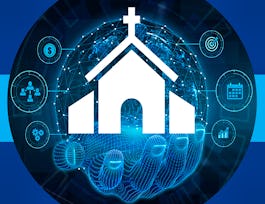This course will be an overview of a development of the theological methods in relation to Korea’s cultural context. Completing the course, the learners can understand cultural influences on the dynamic development of Korean churches and indigenous theology; they can also gain an insight into their own image of God and theological imagination in their own cultural context.



Re-imaging God in Korean Context

Instructor: Soo-Young Kwon
Sponsored by ITC-Infotech
6,102 already enrolled
(103 reviews)
Skills you'll gain
Details to know

Add to your LinkedIn profile
5 assignments
See how employees at top companies are mastering in-demand skills


Earn a career certificate
Add this credential to your LinkedIn profile, resume, or CV
Share it on social media and in your performance review

There are 5 modules in this course
The chief goal of the course will be to understand a rapid growth and dynamic development of the Korean Protestant churches and indigenous theology by exploring various images of God in Korea. The first module will focus on an important methodological shift in contemporary theology from conceptual intellect to the human imagination.
What's included
6 videos1 reading1 assignment
The second module will discuss one’s formation of God-image as a Father with a comprehensive understanding of Freud’s psychoanalysis since many psychoanalytic theorists have argued that one’s early experience of parental relationship has an unavoidable, unconscious impact upon the formation of one’s own God-images.
What's included
5 videos1 reading1 assignment
The module 3 will examine the image of a heavenly God in the cultural context of Korea with the emphasis on Korean Confucian understanding of the "Chon" (heaven). Noting the collective (cultural) representations of the "Chon" (heaven), the interplay among transcendental and immanent images of God in the formation of the Korean Protestant churches will be discussed.
What's included
5 videos1 reading1 assignment
The module 4 will focus on Kwok Pui-lan’s proposal of biblical interpretation as “Dialogical Imagination” in which the Korean Minjung theology strengthens the power of theological imagination. This module will demonstrate how the immanent image of God as rice to the Korean Minjung theology became the central theme of the Christian social movement in Korea.
What's included
5 videos1 reading1 assignment
The last module will first examine how shamanistic beliefs affected the healing ministry of Christianity through the Pentecostal movement in Korea. The module will show that both the Korean Pentecostal group and the liberationist group can commonly interpret God as Spirit to be a fundamental base for their theological imagination.
What's included
5 videos1 reading1 assignment
Instructor

Offered by
Why people choose Coursera for their career




Learner reviews
103 reviews
- 5 stars
82.69%
- 4 stars
14.42%
- 3 stars
1.92%
- 2 stars
0%
- 1 star
0.96%
Showing 3 of 103
Reviewed on Jul 15, 2020
Very informative and interesting presentation of Korean Christianity.
Reviewed on Feb 17, 2018
Concise, completely on topic, lots of excellent references for future study. Very interesting and thought provoking.
Reviewed on Jan 4, 2018
Very interesting course. However, it focused too much on westernized religion is a organized religion in particular. In fact, spirituality, and there's a whole myriad of beliefs blurry and you.
Recommended if you're interested in Arts and Humanities

Yonsei University

The Chinese University of Hong Kong

Duke University

Google Cloud

Open new doors with Coursera Plus
Unlimited access to 10,000+ world-class courses, hands-on projects, and job-ready certificate programs - all included in your subscription
Advance your career with an online degree
Earn a degree from world-class universities - 100% online
Join over 3,400 global companies that choose Coursera for Business
Upskill your employees to excel in the digital economy


